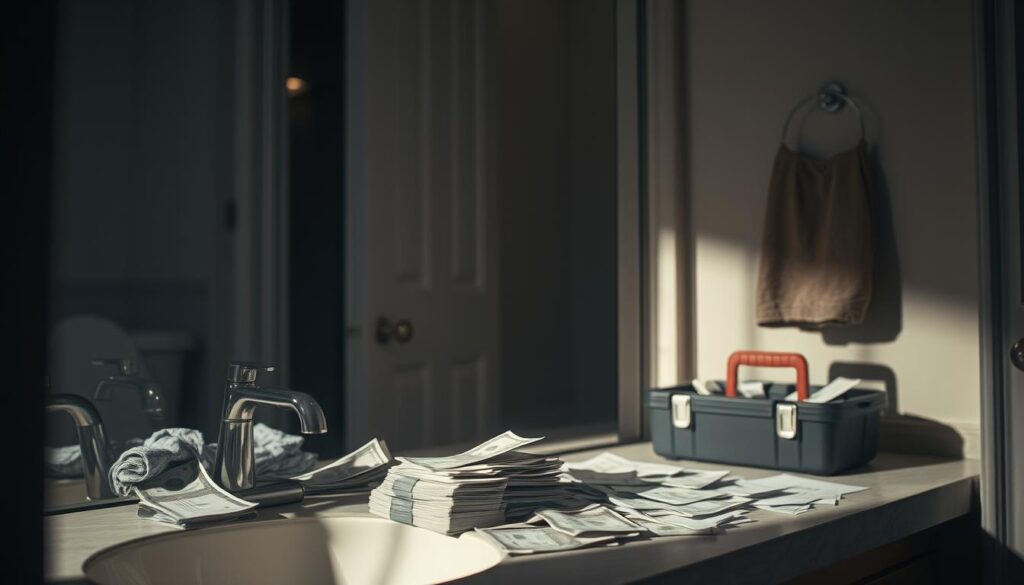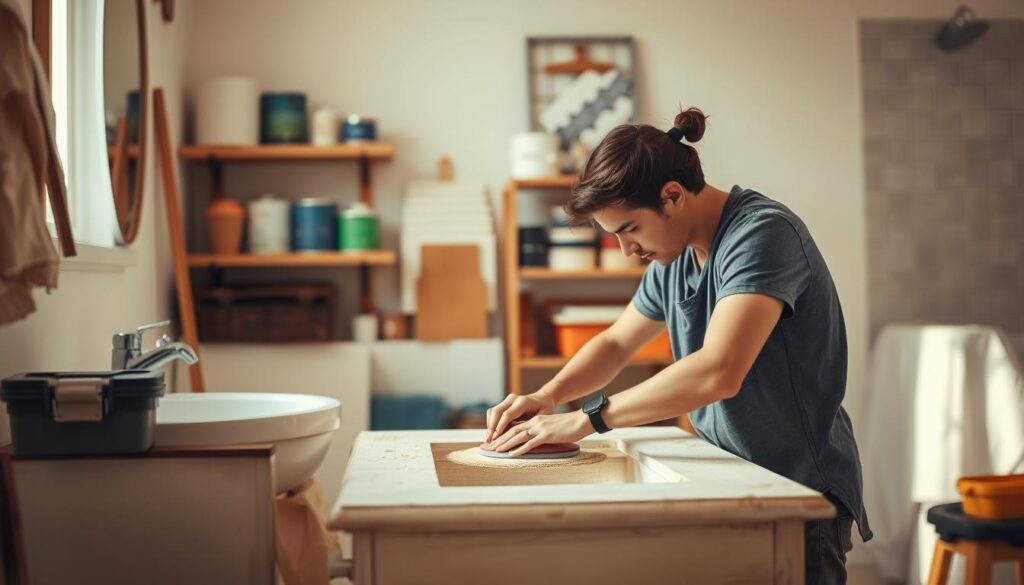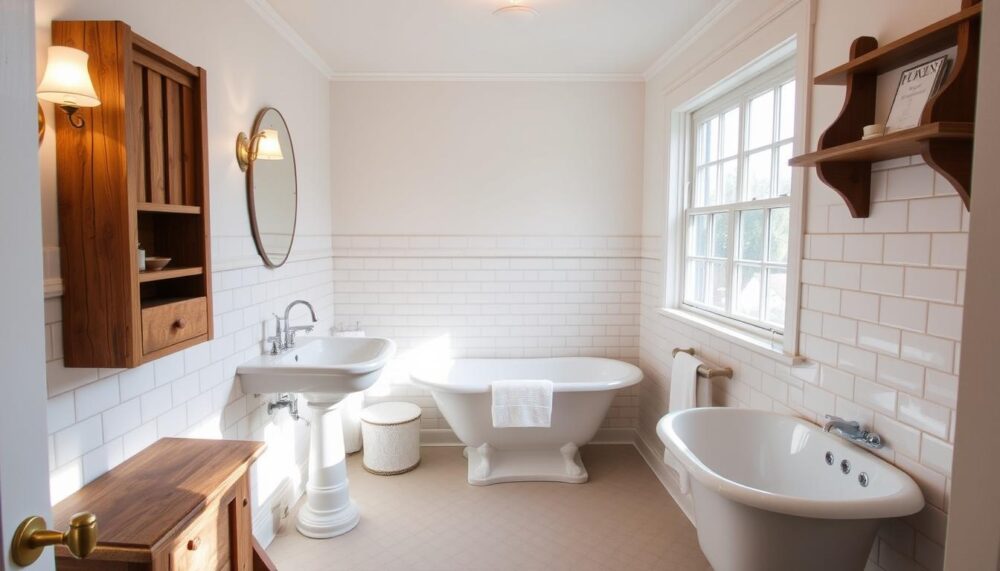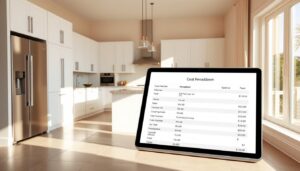Planning a bathroom makeover without overspending? In the UK, refreshing this essential space can vary widely in cost, depending on your choices. A basic refresh may start from £500, while a full overhaul averages between £5,000 and £15,000.
Labour and materials influence the final price. London tradespeople often charge more than those in northern regions. Always set aside 10-20% extra for surprises like plumbing issues.
This guide breaks down expenses, from tiles to fittings. Discover smart ways to save money without compromising quality. Let’s explore your options.
Key Takeaways
- Basic updates start from £500, with full renovations averaging £5,000-£15,000
- Labour costs differ significantly across UK regions
- Include a 10-20% contingency fund for unexpected expenses
- Prioritise durable materials to avoid frequent replacements
- Compare quotes from multiple contractors for the best value
Understanding Average Bathroom Renovation Costs in the UK
Renovating your bathroom doesn’t have to break the bank if you plan wisely. The final cost depends on the scale of your project and the materials you choose. Whether you’re after a simple refresh or a complete transformation, knowing the average prices helps set realistic expectations.
Basic, Mid-Range, and Luxury Options
A basic refresh typically ranges between £5,000 and £7,000. This covers updating fixtures like taps and showerheads without replacing everything. It’s ideal for those wanting a fresh look without major structural changes.
For a more thorough upgrade, mid-range renovations cost £7,000 to £12,000. This includes new fittings, mid-tier tiles, and modern storage solutions. It balances quality and affordability, making it a popular choice.
Luxury transformations start at £12,000 and can soar much higher. These involve bespoke designs, premium materials, and high-end finishes. Think underfloor heating, freestanding baths, and custom cabinetry.
Cost Variations by Bathroom Size
Small bathrooms (under 3m²) usually cost £2,000 to £4,000 to renovate. Compact spaces require fewer materials, keeping expenses lower.
Medium-sized bathrooms (3-5m²) often fall between £4,500 and £6,000. The slight increase accounts for more tiles, larger fixtures, and extended labour.
For spacious bathrooms (over 5m²), expect to pay £6,500 to £10,000. Bigger areas need more materials and time, driving up the budget.
Remember, altering layouts or moving plumbing adds to the costs. Simple updates stay within budget, while structural changes increase the project scope. For more detailed insights, explore our guide on bathroom renovation costs.
Key Factors Affecting Your Bathroom Renovation Cost
Several elements determine the final price when refreshing your washroom. From dimensions to finish quality, each choice impacts your budget. Here’s what influences the tally most.
Size of the Bathroom
Square metres directly affect material quantities and labour time. A compact 3m² space needs fewer tiles and fittings than a 6m² family bathroom.
- Small bathrooms: Require ~15-20 tiles per m², keeping costs low.
- Large layouts: May need plumbing adjustments, adding 10-15% to labour fees.
Quality of Fixtures and Fittings
Choices here range from budget-friendly to luxury. For example:
- Taps: Basic chrome sets start at £30, while designer models exceed £850.
- Baths: Acrylic (£200-£500) vs. cast iron (£800-£1,200).
Investing in durable materials saves long-term replacement costs. Mid-range options often offer the best balance.
Labour Costs and Regional Variations
Skilled tradespeople account for 15-25% of expenses. Rates fluctuate across the UK:
- London plumbers: £45-£75/hour.
- Northern regions: £30-£50/hour.
Tip: Get 3+ quotes to compare local rates. Structural surprises, like damp proofing (£200-£1,000), can inflate bills unexpectedly.
How Much Is a Cheap Bathroom Renovation? Price Breakdowns
A cost-effective refresh doesn’t mean sacrificing style or functionality. By prioritising updates that deliver the most impact, you can achieve a fresh look within your means. Below, we outline three common budget tiers and what they typically cover.
Budget Bathroom Renovations (£500-£1,500)
For under £1,500, focus on cosmetic changes that require minimal labour. Replacing dated hardware or regrouting tiles can modernise the space instantly.
- Paint: A fresh coat (£20-£50) brightens walls without structural work.
- Vinyl flooring: Affordable (£250-£950) and easy to install over existing surfaces.
- Fixtures: Swap taps or showerheads (£30-£150) for an updated feel.
Small Bathroom Renovations (£2,000-£4,000)
Compact layouts (under 3m²) benefit from strategic upgrades. Reusing the existing layout avoids plumbing adjustments, saving 15-20% on labour.
- Basic suites: New toilet, basin, and bath from £250-£800.
- Tiling: Ceramic tiles (£15-£30/m²) for splashbacks or floors.
- Case study: A 3m² makeover for £3,800 included a walk-in shower, vanity unit, and heated towel rail.
Medium and Large Bathroom Costs (£4,500-£10,000)
Full refurbishments in bigger spaces allow for mid-range fittings. Porcelain tiles (£40-£80/m²) offer durability, while prefabricated units cut custom costs.
- Layout retention: Keeping pipes in place reduces fees by £500-£1,200.
- Mid-tier suites: £1,000-£3,000 for a cohesive look.
- Labour: Allocate 20-30% of the total for skilled tradespeople.
Tip: Compare at least three quotes to balance quality and budget. Minor changes, like repositioning lights or adding shelving, maximise impact affordably.
Cost of Essential Bathroom Products in the UK
Selecting the right fittings and finishes transforms your washroom while staying within budget. From taps to tiles, prices vary based on quality and design. Understanding these differences helps you allocate funds wisely.
Taps, Toilets, and Sinks: Budget to Premium
Basic chrome taps start at £30, offering reliable performance without frills. Freestanding designs with advanced features can exceed £850. Water-saving models reduce utility bills long-term.
Close-coupled toilets cost around £250, while wall-hung versions begin at £350+. Pedestal basins suit compact spaces, with installation fees averaging £330-£360.
| Product | Budget (£) | Mid-Range (£) | Premium (£) |
|---|---|---|---|
| Taps | 30-100 | 100-300 | 300-850+ |
| Toilets | 250-350 | 350-600 | 600-1,200+ |
| Basins | 80-150 | 150-400 | 400-2,000+ |
Baths and Showers: Comparing Options
Acrylic baths (£200-£500) are lightweight and retain heat well. Steel tubs (£800-£1,200) offer durability but feel colder initially. Walk-in showers suit accessibility needs, with enclosures ranging from £200 to £1,000.
For more detailed cost comparisons, see our bathroom renovation cost guide.
Flooring and Wall Materials
Ceramic tiles (£15-£30/m²) provide water resistance at lower costs. Natural stone (£40-£100/m²) adds luxury but requires sealing. Luxury vinyl (£8-£20/m²) mimics pricier materials affordably.
- Porcelain tiles: £13-£50/m² with excellent durability
- Underfloor heating: £100-£1,000 depending on system type
- Grout and adhesives: Allow £200-£400 for professional application
Tip: Mixing high-impact premium features with budget basics creates a balanced look. Focus splurges on frequently used items like showers.
Labour Costs for Bathroom Renovations
Understanding labour expenses helps manage your renovation budget effectively. Skilled tradespeople account for a significant portion of the total spend, with rates varying by expertise and region. Here’s how to navigate these costs without compromising quality.
Average Hourly Rates for Tradespeople
Plumbers and electricians charge differently across the UK. In London, plumbers may ask for £45–£75 per hour, while northern regions average £30–£50. Electricians typically cost £40–£75 hourly, depending on certifications.
Tile installers often price by square metre (£100–£120/m²). Day rates for general contractors range from £150–£250, but fixed-price projects can offer better predictability.
Plumbing and Electrical Work Expenses
A full plumbing refit averages £1,500–£3,000, including pipe adjustments and fixture installation. Electrical updates, like adding downlights or heated towel rails, require Part P certification—factor in £200–£500 for compliance checks.
- Regional differences: Urban areas command higher fees than rural locations.
- Complexity matters: Moving pipes or wiring adds 15–20% to labour costs.
Tips for Reducing Labour Costs
Combine tasks to minimise call-out fees. For example, schedule plumbing and electrical work concurrently. Avoid peak seasons (spring/summer) when demand—and prices—rise.
- Compare quotes: Get three detailed estimates to spot outliers.
- DIY prep: Remove old tiles or fixtures yourself to cut labour hours.
- Tip: Opt for mid-week bookings; some tradespeople offer discounts for quieter periods.
Hidden Costs and Contingencies to Plan For
Even the most carefully planned project can encounter surprises. Setting aside extra funds for unforeseen expenses ensures your bathroom refresh stays on track without financial stress.

Structural Issues and Damp Proofing
Older UK properties often reveal hidden problems during renovations. Damp proofing typically costs £200–£1,000, depending on severity. Look for these warning signs before starting work:
- Peeling paint or wallpaper near floors
- Musty odours in poorly ventilated corners
- Salt deposits on walls (efflorescence)
Asbestos removal adds £1,000–£2,500 if found in old flooring or insulation. Always commission a professional survey before disturbing suspicious materials.
Unexpected Plumbing or Electrical Work
Outdated systems often need upgrading to meet current regulations. Lead pipe replacement runs £50–£100 per metre. Factor in these potential extra costs:
| Issue | Average Cost | Solution |
|---|---|---|
| Faulty wiring | £400–£800 | Full circuit testing |
| Leaking pipes | £150–£500 | Section replacement |
| Ventilation upgrades | £200–£600 | Extractor fan installation |
Building regulation compliance adds 5–10% to your budget. This covers water efficiency standards and electrical safety certificates.
Smart tip: Allocate 15–20% of your total budget for contingencies. This covers unexpected discoveries while keeping your project moving forward smoothly.
Budget-Friendly Materials and Where to Find Them
Premium looks don’t always demand premium prices with clever alternatives. By selecting strategic materials and knowing where to shop, you can achieve high-end aesthetics while keeping costs manageable. The UK market offers numerous options for style-conscious renovators working within tighter budgets.
Affordable Alternatives to High-End Finishes
Porcelain tiles mimic marble beautifully at 70% less cost. Their durability makes them ideal for wet areas, requiring minimal maintenance compared to natural stone. Modern printing techniques create remarkably authentic veining patterns.
- Quartz worktops (£200-£400/m) instead of granite (£300-£600/m)
- Vinyl plank flooring (£8-£20/m²) replicating hardwood (£40-£100/m²)
- Acrylic baths (£200-£500) versus cast iron (£800-£1,200)
Discount Retailers and Online Marketplaces
Major DIY chains like B&Q and Victorian Plumbing frequently offer 30-50% discounts on end-of-line products. Sign up for their newsletters to catch flash sales. Reclaimed tile specialists sell quality flooring for £10-£30/m² – perfect for adding character affordably.
When sourcing second-hand:
- Inspect ex-display items thoroughly for defects
- Verify measurements before purchasing online
- Meet eBay/Gumtree sellers in daylight at safe locations
The right choice of suppliers and materials can transform your space without transforming your bank balance. With careful planning, even premium looks become accessible.
DIY vs. Hiring Professionals: What’s Right for You?
Deciding between DIY and professional help depends on your skills and the job’s complexity. While tackling tasks yourself can save money, some work requires certified expertise to ensure safety and compliance. Let’s explore where you can roll up your sleeves and when to call in the pros.

Tasks You Can Safely DIY
Simple updates offer up to 50% savings on labour. These beginner-friendly jobs are ideal for confident homeowners:
- Painting: Refresh walls with moisture-resistant paint for under £50.
- Caulking: Reseal around baths and sinks to prevent leaks.
- Mirror installation: Use adhesive strips for lightweight frames.
Tile installation is achievable with patience, though complex patterns may need pros. Renting tools like tile cutters costs £20-£40/day—compare this to £100-£120/m² for professional fitting.
“DIY errors can void home insurance if they cause damage. Always check your policy before starting.”
When to Call in the Experts
Certified tradespeople handle legally restricted or high-risk jobs. In the UK, electrical work and gas plumbing require Part P/Gas Safe registration. Professionals also provide 10-25 year guarantees on fittings.
Consider hiring for:
- Rewiring lights or installing heated floors
- Relocating pipes or drainage systems
- Structural changes like removing walls
Safety tip: Test water pressure and isolate supplies before any DIY plumbing adjustments. For complex projects, combining professional work with your efforts balances cost and quality.
Top Tips to Save Money on Your Bathroom Renovation
Smart planning can transform your washroom without draining your wallet. Focus on high-impact changes and clever reuse to maximise your budget. Here’s how to achieve a fresh look while keeping costs under control.
Prioritising Upgrades
Not all changes deliver equal value. Splurge on features you use daily, like showers, and save money on less critical items. Energy-efficient taps or LED lighting reduce long-term bills, offering a return on investment.
Consider a phased approach:
- Phase 1: Replace worn-out fixtures (taps, showerheads).
- Phase 2: Update tiles or flooring the following year.
- Phase 3: Add luxury touches like heated rails later.
Reusing or Refurbishing Existing Fixtures
Before replacing, explore refurbishment options. Regrouting tiles or refinishing a bath (£300) costs a fraction of replacements (£900+). Keep the layout unchanged to avoid £1,500–£3,000 in plumbing adjustments.
| Fixture | Refurbishment Cost | Replacement Cost |
|---|---|---|
| Bath | £200–£400 | £500–£1,200 |
| Cabinets | £150 (paint/hardware) | £600–£1,500 |
| Taps | £30 (re-polish) | £80–£300 |
Pro tip: Upcycle vintage mirrors or shelves for unique storage space. A lick of moisture-resistant paint revitalises tired walls for under £50.
“Investing in quality fittings for 10+ years beats replacing cheap items every 3–5 years.”
By blending strategic upgrades with savvy reuse, you’ll create a stylish way to refresh your bathroom affordably.
Conclusion
Transform your space wisely with strategic spending on key upgrades. Whether refreshing fixtures or tackling a full bathroom renovation, prices vary from £500 for basic updates to £15,000 for luxury overhauls. Always compare three quotes to balance cost and quality.
Use project management apps to track expenses and timelines. Material prices may rise in 2024, so lock in deals early. Prioritise durable fittings to save money long-term.
Ready to start? Consult a professional to refine your budget and design. A well-planned project delivers lasting value without surprises.
FAQ
What’s the average cost of a budget bathroom renovation in the UK?
The price depends on size and finishes, but basic projects typically range from £500 to £4,000. Larger spaces or premium fittings will push costs higher.
How much does labour add to the total expense?
Tradespeople charge £150-£250 per day, with plumbing and electrical work often costing extra. Always get multiple quotes to compare rates.
Can I save money by doing some work myself?
Yes! Painting, tiling, or installing simple fixtures can cut costs. However, leave complex plumbing and wiring to professionals for safety.
What are affordable alternatives to expensive bathroom materials?
Vinyl flooring mimics pricier tiles, while acrylic baths cost less than stone resin. Discount retailers like B&Q or Wickes offer budget-friendly options.
Should I include underfloor heating in a cheap renovation?
It’s a luxury add-on, but electric mat systems start around £200 for small spaces. Focus on essentials first if funds are tight.
How long does a typical bathroom renovation take?
A straightforward update takes 5-10 days. Delays can happen if structural issues arise or custom fittings require longer lead times.
Where should I splurge versus save in my project?
Invest in quality taps and shower valves—they endure daily use. Save on decorative tiles or vanity units where style matters more than durability.
Are there hidden costs I should prepare for?
Yes—damp proofing, pipe rerouting, or upgrading old wiring can add 10-20% to your budget. Always keep a contingency fund.
What’s the cheapest way to refresh my bathroom’s look?
Regrouting tiles, repainting walls, and updating fittings like towel rails or mirrors make a big impact without major spending.






